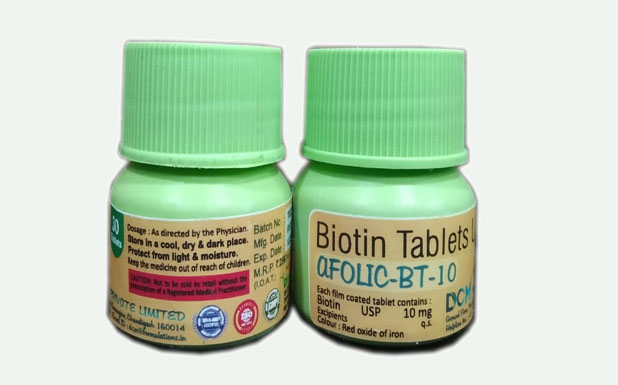
Composition
- Each Tablet Contain:
- Biotin USP 10 mg
Packing
- 30 Tab
Bottle
MRP
- 256
Overview
Biotin is a water-soluble B-vitamin that helps your body convert food into energy. It is especially important during pregnancy and breastfeeding. In addition, biotin is important for the health of your hair, skin and nails.
Indications
- Hair loss
- Diabetes
- Diabetic nerve pain
- Brittle fingernails and toenails.
- Improve the health of your skin
- Supports your metabolism
- Lower cholesterol
- Regulate blood sugar
Mechanism of Action
Biotin is a water-soluble B-complex vitamin which is composed of an ureido ring fused with a tetrahydrothiophene ring, which attaches a valeric acid substituent at one of its carbon atoms. Biotin is used in cell growth, the production of fatty acids, metabolism of fats, and amino acids. It plays a role in the Kreb cycle, which is the process in which energy is released from food. Biotin not only assists in various metabolic chemical conversions, but also helps with the transfer of carbon dioxide. Biotin is also helpful in maintaining a steady blood sugar level. Biotin is often recommended for strengthening hair and nails. Consequenty, it is found in many cosmetic and health products for the hair and skin. Biotin deficiency is a rare nutritional disorder caused by a deficiency of biotin. Initial symptoms of biotin deficiency include: Dry skin, Seborrheic dermatitis, Fungal infections, rashes including erythematous periorofacial macular rash, fine and brittle hair, and hair loss or total alopecia. If left untreated, neurological symptoms can develop, including mild depression, which may progress to profound lassitude and, eventually, to somnolence; changes in mental status, generalized muscular pains (myalgias), hyperesthesias and paresthesias. The treatment for biotin deficiency is to simply start taking some biotin supplements. A lack of biotin in infants will lead to a condition called seborrheic dermatitis or "cradle cap". Biotin deficiencies are extremely rare in adults but if it does occur, it will lead to anemia, depression, hair loss, high blood sugar levels, muscle pain, nausea, loss of appetite and inflamed mucous membranes.
Side Effects
Biotin appears very safe, even at extremely high doses however common side effects include skin rashes, digestive upset, problems with insulin release, and kidney problems.
Interaction
Anticonvulsants may react with biotin. The reason could be that anticonvulsant treatment increases biotin catabolism, which leads to reduced biotin status and inhibition of intestinal biotin absorption